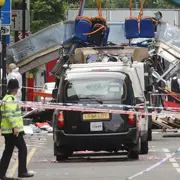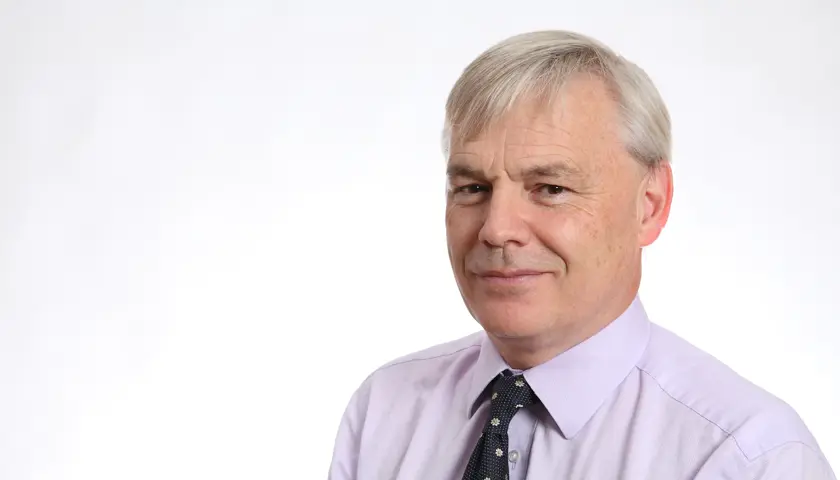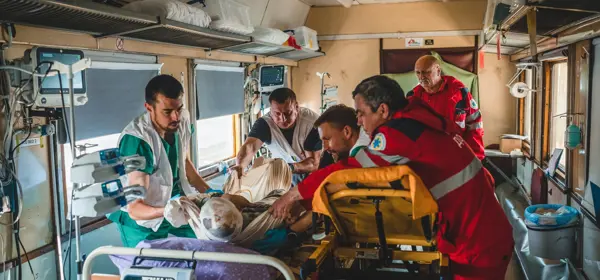
7th July – the doctors who ran towards danger
One of the four bombs which exploded in London on 7 July 2005 was on a bus outside BMA House in Tavistock Square. Peter Blackburn hears from two of the doctors who treated the wounded, turning the courtyard of BMA House into a field hospital
First there was the helicopter. It had been hovering in the skies above BMA House, which sits on Tavistock Square, just a few minutes’ walk from Euston station, for an unusually long period of time.
A television was on in the room and reporters were speaking of power surges on the underground. A colleague phoned to say the Northern Line was experiencing difficulties and he was going to be late.
Peter Holden, a Derbyshire GP trained in immediate emergency care who then flew with helimed 92 – an emergency medical service helicopter – knew something was wrong. The helicopter would be using an enormous amount of power and fuel to stay in the sky for so long. ‘You would never do that,’ Dr Holden thought.
Then – suddenly – everything went ‘salmon pink’. It was the pressure wave that preceded the ‘muffled boom’ with ‘real force behind it’.
Prior experience
Professor Sir Sam Everington was then BMA deputy council chair and was in the chair’s office when the bomb went off. He knew what had happened straight away.
‘I'd been in Whitehall when the IRA tried to set off a bomb or a rocket at Downing Street, so I knew what it was.’
Dr Holden shouldn’t really have been there. He was due at the Law Society with a group of doctors leaders but had stayed behind as he had been told to expect a call from a government minister that he wanted to take.
But, as one of perhaps just 50 or 60 trained major incident commanders in the country at the time, and with 14 other doctors in the building to support him, there could have been few locations in the country better placed to muster an immediate response.
Sir Sam tore down the stairs to the scene. ‘It was bizarre,’ he says, ‘I remember the pigeons crowing, and the stillness and quiet just with the occasional cry of pain. And there it was right in front of you.’
I remember the stillness and quiet just with the occasional cry of pain
Sam Everington
Dr Holden, who was also present at the Hillsborough disaster, told security staff he and colleagues wouldn’t be evacuating the scene – there was ‘work to be done’ – and ordered staff to close the blinds to protect from glass and stay inside for a brief period for fear of a second bomb designed to target the rescuers.
The training – all those years of responding to accidents on rural roads with relatively basic equipment and none of the calm and support of a GP surgery or hospital ward – had kicked in. Dr Holden assumed control of the situation, taking ‘gold command’.
His colleagues knew he was the man who needed to be in charge. Few could boast the qualifications to lead in a horrendous moment like this. Just four years earlier they had been in the same building watching the horrors of 9/11 and Dr Holden had reeled off the responses required from the emergency services in such a major incident. He knew exactly what he was doing.
Dr Holden, Sir Sam, the 13 others from the building, some BMA staff and several other doctors who had been nearby, leapt into action. They used the inner courtyard of BMA House – a quadrangle formed around a memorial to those who died in the two world wars, which had a degree of protection and calm away from the scene of the incident – to cover the dead and to triage and treat patients.
They barely had any medical equipment or supplies, the headquarters being offices and conference facilities rather than a place of healthcare, and cafe tables became makeshift stretchers with tablecloths used as bandages. Doctors who hadn’t put a drip in for 30 years were inserting cannulas into people ‘like they last did it yesterday’.
Patients were given identity tags with their latest vital signs and continuously monitored and re-triaged – ‘because triage has to be dynamic’.
One woman at the scene said Dr Holden’s arrival – the number 30 bus torn open – transformed things from ‘utter chaos’ to ‘something resembling sense’.
The doctors are keen to remember the work staff members carried out, bravely staying in the building to help, such as the porter who found a white board, to allow Dr Holden – wearing a pin-striped suit – to make notes and organise the response and disable the alarm system and the member of conference staff who gathered food and drink and ensured the responders were looked after.
These were extraordinary scenes. Patients were kept alive and supported with little more than first-aid kits until supplies arrived in ambulances and emergency vehicles, which began to take patients away. Dr Holden was also forced to invoke ‘priority 4’ with respect to two of the victims – a decision usually taken at secretary of state level and almost never used in civilian situations where people are declared so severely injured that they’re not going to survive, no matter what you do.
‘I had to do it,’ Dr Holden says. ‘I knew that if we didn’t do the most for the most we would lose more people than we had to.’
Shared trauma
Dr Holden, recently elected treasurer of the BMA, still walks through the gates where he made that decision several times a week. The significance of that moment is never lost on him.
Even after the patients had all been taken to hospital, there was more work to do. Sir Sam spoke to journalists and reporters on behalf of the BMA that day, leading the media response. And Dr Holden retrieved all of his notes and records from the day – having to ring the ambulance service’s gold commander to ask him to order a police officer to stop refusing entry to the room where they were.
He had written a draft report by the end of the evening from a friend’s house in Norfolk. By the end of the weekend his official report was complete. It was to prove incredibly useful given years passed before he was called to give evidence at the inquest.
The weeks after the attacks were more difficult for some than others. Sir Sam rang all of the colleagues who had been present, acutely aware of the shared trauma they had experienced. ‘Most were in a good place. Some were struggling.
‘One thing I learned afterwards is that people have great philosophies about counselling and things but really you need to make it personalised. One of the doctors I rang just said: “No Sam, thanks very much for ringing, it’s the right thing to do, but I’m fine. Don’t worry about me. Call the others.”’
I knew that if we didn’t do the most for the most we would lose more people than we had to
Peter Holden
Sir Sam, a GP in Tower Hamlets, who also holds a litany of leadership and representative roles, adds: ‘I think the camaraderie of what we did together created a bond. I remember being asked at the inquest whether I thought we had saved people’s lives. I think we did the best we could and I hope that, as a result, lives were saved.’
For Dr Holden, there was a similar realisation that counselling or therapy wasn’t the right solution. He needed to be around those who were there, who had seen what he had seen.
He says: ‘You go out, you have a drink, and you talk through what happened. That happened several times within a few weeks. You chew through what happened. It lets you get things into perspective.’
There were silver linings among the horrendous clouds of that day, Dr Holden says. ‘Our emergency preparedness as a nation is much better.’ And in the three years following 7/7 BMA House was used to train 100 doctors in the pre-hospital care that formed the foundation of Dr Holden’s ability to respond so calmly.
It also showed the best of humanity – when people choose to care in the most difficult of circumstances. The doctors who ran toward danger, and the staff members who stayed to help when they had every right to get home to their loved ones.
BMA council chair Tom Dolphin says he has a ‘strong sense of pride’ when reflecting on what his colleagues and friends did that day.
He says: ‘I was working in [the emergency department] at the Royal London that day and, amidst the bustle and busyness of what was happening, I was very conscious that people I knew were right there in BMA House in the thick of it. I was worried for them but also incredibly proud.
‘Everybody who was at BMA House on that day remembers it very clearly as a day that changed everybody’s lives. I don’t think anybody goes through a day like that without coming out as a different person.’
Dr Dolphin adds: ‘I have a strong sense of pride that the doctors who were here, even those for whom emergency care is not their usual practice, were able to step up and provide support, care and comfort for the victims. They did that in a hugely traumatic situation that came out of nowhere – with no warning – and that’s something we can be very proud of as a profession and as their colleagues and friends.
‘People go into medicine wanting to care for patients. That’s what motivates all of us. And that really showed up in those moments in the strongest possible way.’
In commemoration
Today marks 20 years since the scenes from that day. In total, London was hit by four suicide bombs. Fifty-two people were killed and 700 more were injured. A service of commemoration will be held at St Paul’s Cathedral, with Dr Holden and Sir Sam in attendance.
Dr Holden says he will take a moment to find a quiet place and reflect for a few minutes during the day.
And Sir Sam says the event will ‘surface a whole raft of things’ when confronted with the memories that have been put to the back of the brain.
All these years on, the men are clear there is a ‘life-changing’ element to going through something so shocking and significant.
Dr Holden says: ‘You certainly learn what matters in life when you’ve done something like this. In some ways you get more tolerant, and in other ways you get less tolerant. I was a bit snappy for a week or two afterwards but people saw it for what it was and understood. Sometimes now you’re so laid back about things people think you don’t care, but it’s not that – you just can’t see everything as being that big in the scale of things. It all brings perspective.’
You certainly learn what matters in life when you've done something like this
Peter Holden
Sir Sam says: ‘I think I always had this philosophy that life is not a rehearsal. And when something like this happens it really highlights that. You realise death faces all of us and you want to make the most of life. I do so many different things now because I’m running out of time. I’ve got to do it now.’
He adds: ‘We had a family competition to come up with a motto – I’ve got seven brothers and sisters and lots of nephews and nieces – and what we came up with is courage and kindness. I’m not saying that’s what I am – we are all imperfect. But that’s what I aspire to be. That’s the focus in life.
‘There was nothing but courage and kindness from everyone present that day.
‘You realise the beauty of humankind in moments like that.’
(Main image credit: Getty – taken the day after the bombings, when forensic officers were carrying out their work)




